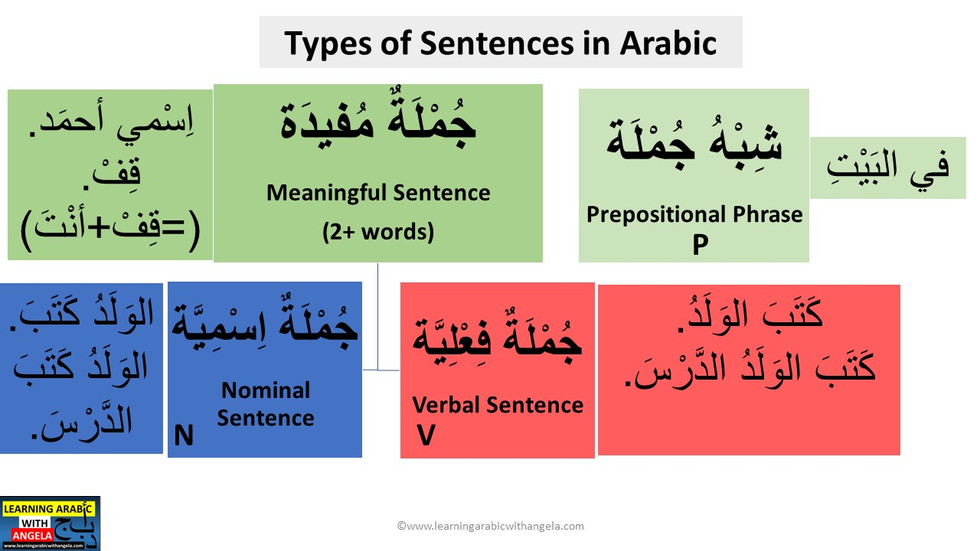Understanding the Arabic Word
- LearningArabicWithAngela
- Jun 22, 2019
- 4 min read
Updated: Sep 4, 2022
Learn about parts of speech in Arabic grammar and what constitutes a noun, a verb and a particle. Also, learn to easily tell apart a nominal and a verbal sentences. (Recommended for intermediate learners+)
الاِسْم والفِعْل والحَرْف (أقْسامُ الكَلِمَة) - الجُمْلَةُ الاِسْمِيَّةُ والجُمْلَةُ الفِعْلِيَّةُ.
In this blog post, we will briefly discuss the Arabic word or "al-kalima" الكلمة. According to Arabic Grammar, there are three types or categories of words: nouns, verbs and particles. A noun is called "Ism" اسم; a verb "Fiʻl" فغل, and a particle "Ḩarf". Understanding these three categories is important as a basic introduction into Arabic grammar.
To simplify things, we can say that a noun or "ism" is not a verb or tense, and carries a significant meaning on its own; the English equivalent of: nouns, pronouns, adjectives, and adverbs. "Ism" also literally means "name" in Arabic. A noun, can name or refer to something that is concrete or abstract, definite or indefinite, singular or plural, masculine or feminine. It can be used to name a person, thing, animal or abstract idea. A noun would typically function as a subject or object in an Arabic sentence.
Let's give some examples on Arabic nouns: the name of a person is "Ism", such as Maha or Mousa. The name of a city or country is "Ism" too, such as "Beirut" or "Canada". The words tiger "Nimr" نمر, cat "Qittah" قطة, dog "Kalb" كلب, book "Kitaab" كتاب, and wall "Haa'iţ" حائط are "Asmaa'" أسماء. So are the words: day "Yawm" يوم, week "usbuuʻ"أسبوع, independence "Istiqlaal" استقلال, beautiful "Jameel" جميل, artist "Fannaan" فنّان, doctor "Ţabiib" طبيب, student "Tilmiidh" تِلْميذ morning "Sabaaḩ"صباح etc... Pronouns as well: he "Howa" هو, you "Anta" أنْتَ, this "Haadha" هذا, my car "Sayyaaratii" سيارتي.. Nouns can also be singular, dual, or plural: car "Sayyaara" سيّارة, two cars "Sayyaarataan" سيّارتانِ, three cars "thalaathu Sayyaaraat" ثلَاثُ سَيّارات etc... Relative pronouns also fall under the noun category, such as الَّذي، الَّتي "al-ladhii, al-latii" (what; which; that).
A verb or "Fiʻl" فعل denotes an action, in either: Past, Imperfect Tenses: Present, Future, Prohibition and all other variations, and Imperative or Command)
Example:
أكلَ Akala” Ate"
(Past Tense)
يأْكُلُ Ya’kulu” Is Eating"
(Imperfect Tenses: Present, Future, Prohibition and all other variations)
كُلْ Kul” Eat"
(Imperative/ Command)
A particle or "Ḩarf" حرف does not have a meaning on its own and is understood from the context of the sentence and words in it. Particles or "Ḩuruuf" حروف are what is equivalent in English to prepositions, prefixes, conjunctions, articles and others.
Examples:
وَ Wa” And"
لا Laa” No"
مِنْ Min” From"
"Ila" To إلى
"Na'am" Yes نَعَم
"Yaa" O يا (when calling someone; vocative particle)
ثُمَّ Thumma” Then"
سَوْفَ Sawfa” Will"
Just be mindful that what you would consider as a preposition in English and automatically assume to be a particle, doesn't necessarily fall under the "Ḩarf" حرف or particle category in Arabic, such as "names of places and time" اسْماءُ المَكانِ وَالزَّمان, like "taḩta" تَحْتَ, which means "under or blow", or "maʻa" مَعَ (with), or "ʻinda" عِنْدَ (at a certain time or place).
Watch this comprehensive lesson to master how to tell apart a noun, verb and particle in Arabic. Nouns in Arabic include a variety of things, which is different to English. Identifying a noun also helps learners distinguish nominal and verbal senteces, in order to construct sentences utilizing both methods. You will also get to practise at each step.
Here are some snippets and notes from the lesson:
Enjoy the free downloads and lessons. For more free Arabic learning and reading resources, check out our Stories and Downloads pages. Don't miss out on any new additions and free resources, subscribe to the blog (click subscribe from the main menu). And stay tuned by Liking our Facebook Page. It's the best way to stay in touch!
Watch our short stories and other Arabic learning videos on our YouTube channel (Like and Subscribe to get notified of any new videos).
Please feel free to share any ideas, comments or resources with other readers by leaving a comment below or emailing directly to the blog.
I hope you have enjoyed the lesson! (When sharing, please always share from the blog post link and mention the source.) Enjoy the free downloads and lessons. For more free Arabic learning and reading resources, check out our Stories and Downloads pages. Don't miss out on any new additions and free resources, subscribe to the blog (click subscribe from the main menu). And stay tuned by Liking our Facebook Page. It's the best way to stay in touch! You can also subscribe and watch our useful videos on YouTube, including short stories with explanation, one minute learning, and other!
.png)













